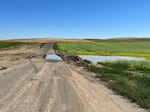A mega-dairy site near Boardman once plagued by a series of environmental violations and penalized with thousands of dollars in fines is now less likely to ever become a dairy again.
Six years after Lost Valley Farm in Eastern Oregon shut down following more than 200 violations, the farm’s current owner, Canyon Farms, has asked to decommission the site as a Confined Animal Feeding Operation, or CAFO. But the area still remains contaminated, and agriculture regulators are seeking public comment as they look to remediate the site.
The move is a win for environmental groups who’ve asked regulators for assurance the site will not be turned over to another dairy farm operator.

FILE - This photo from an Oregon Department of Agriculture report shows water runoff on a field. Runoff events, along with fertilizer leaks, have incurred fines for Easterday Dairy, before it was sold to the current owner, Canyon Farms.
Courtesy of Oregon Department of Agriculture
In 2017, Lost Valley Farms received a CAFO permit from the Oregon Department of Agriculture and Department of Environmental Quality to house 30,000 dairy cattle.
But the owner at the time, Greg te Velde, began housing cows before construction was finalized and before completing a waste management plan. The farm was soon cited for violating its CAFO permit, and a year later, ODA slapped Lost Valley with $187,000 in fines for overflowing manure lagoons and leaky waste storage, among other violations. Lost Valley later filed for bankruptcy.
The site was eventually sold to Canyon Farms in 2023 – it was briefly owned by Easterday Dairy but that operation shut down after it struggled to keep up with regulatory compliance. No animals have been permitted to be at the site since 2019.
In April, Canyon Farms, which is managed by Fall Line Capital, a California-based venture capital firm, asked to decommission the site as a CAFO. As part of that process, the owners are required to remove all CAFO infrastructure, like milking parlors, barns and animal stalls, according to Isaak Stapleton, the director of the natural resources program area at ODA. He confirmed the owners have already done that.
“They have decommissioned the facility. So the dairy operations, all of the equipment, animal stalls, all that stuff has been removed from the site,” Stapleton said.
Fall Line Capital did not respond to OPB’s request for comment.
While ODA has granted the request, three monitoring wells at the site still show elevated nitrate concentrations above “background limits” or nitrate levels from before the site was permitted as a CAFO. Stapleton said the owner is required to bring the wells back into compliance and report monthly samples to ODA.
He said it’s hard to say why nitrate levels are still above background limits but believes it’s likely because of the manure spills from when it was managed by Lost Valley Farm.
Tarah Heinzen, an Oregon-based attorney for Food and Water Watch – an environment watchdog group – sees the move as a step in the right direction. She said no large dairy farm should’ve been permitted there in the first place.
That’s because the farm is in what’s known as the Lower Umatilla Basin Groundwater Management Area – which includes Northern Morrow and Umatilla counties and the cities of Hermiston, Boardman, Irrigon, Stanfield and Echo.
For more than 30 years, the region’s groundwater has been polluted with contaminants, primarily nitrates from irrigated agriculture. According to the U.S. Environmental Protection Agency, nitrate levels exceeding 10 milligrams per liter can cause serious health effects.
“This is an area where people are exposed to unsafe drinking water in part because factory farms and other big ag polluters are contributing nitrates to an already polluted aquifer,” Heinzen said. “It does not make sense to allow a new source of nitrates into a groundwater management area.”
Heinzen said she’d like to see stronger clean-up efforts at the site.
ODA is requiring Canyon Farms to bring the monitoring wells below background limits, yet Oregon has a self-imposed goal to bring nitrate levels in groundwater management areas to seven milligrams per liter or less. The background limits for two of the wells are 15 and 19 milligrams per liter respectively.
“They need to require that the nitrates are lowered to a health based limit of seven milligrams per liter, not the so-called “background levels” that are currently in the plan,” Heinzen said. “We want to see this actually achieve results that are safe for public health and those who might be impacted in their wells down-gradient of this operation.”
ODA did not clarify why it’s not requiring the owner to bring nitrate levels to safe drinking standards.
Meanwhile, the state is seeking written public comments for input on a proposed remedial groundwater cleanup plan for the site. Comments are due by July 19.
